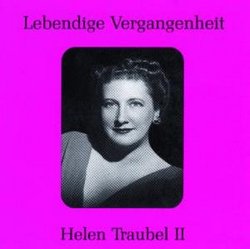| All Artists: Richard [Classical] Wagner, Wolfgang Amadeus Mozart, Giuseppe Verdi, Amilcare Ponchielli, Frieder Weissmann, Charles O'Connell, RCA Victor Orchestra, Helen Traubel Title: Lebendige Vergangenheit: Helen Traubel II Members Wishing: 1 Total Copies: 0 Label: Preiser Records Release Date: 10/26/2004 Genre: Classical Styles: Opera & Classical Vocal, Historical Periods, Classical (c.1770-1830), Modern, 20th, & 21st Century, Romantic (c.1820-1910) Number of Discs: 1 SwapaCD Credits: 1 UPC: 717281895965 |
Search - Richard [Classical] Wagner, Wolfgang Amadeus Mozart, Giuseppe Verdi :: Lebendige Vergangenheit: Helen Traubel II
 | Richard [Classical] Wagner, Wolfgang Amadeus Mozart, Giuseppe Verdi Lebendige Vergangenheit: Helen Traubel II Genre: Classical
|
Larger Image |
CD Details |
CD ReviewsThe Lost Art of the Heroic Wagnerian Soprano David A. Kemp | Plano, TX USA | 09/09/2006 (5 out of 5 stars) "Helen Traubel (1899-1972) was one of the very few great heroic Wagnerian sopranos of the twentieth century, a true Isolde/Brunnhilde voice. In fact, to show how rare a breed this is, the United States has produced only three in its history, and two of them (Nordica and Fremstad) were singing a hundred years ago; Traubel was the third. Worldwide, there have been only four or five great heroic Wagnerian sopranos since 1920: Leider (German), Flagstad (Norwegian), Traubel (American), Nilsson (Swedish), and perhaps Lubin (French). These voices don't grow on trees. Nilsson was the only one in the second half of the twentieth century, and today we have none.
Traubel was a big, deep-chested woman with a huge voice; soprano voices don't get any bigger. Her heyday was the 1940s, and her career was almost entirely at the Metropolitan, where she sang from 1937 to 1953, almost exclusively Wagnerian roles. Her career was to some extent a victim of both her own rather peculiar lack of "push" or ambition (she got a late start--she was a perfectionist who prolonged her vocal studies for more than ten years--and almost had to be dragged reluctantly into a major operatic career), and the fact that she was unfortunately, and rather unfairly, always in the shadow of Flagstad, with the result that she was undervalued in her own time and for a long while thereafter. When Flagstad retired to Norway in 1941 to hole up there for the duration of World War II (not returning to the Met until 1950), Traubel became by default the Met's reigning Wagnerian soprano. She was a refreshingly unpretentious "Saint Louis gal" of German descent who, along with her colleague and frequent partner, the great heroic tenor Lauritz Melchior, could and did poke fun at the pompous world of grand opera. She liked singing popular music and appearing on TV and in movies and even (heaven forbid!) in nightclubs, these low-brow predilections leading to her rupture with autocratic Met general manager Rudolph Bing and her departure from the Met in 1953. A voice like hers should have been a natural for the famed Wagner Festspielhaus at Bayreuth, and would have made her welcome in the great European opera houses, but she had virtually no international career and never sang opera in Europe. She was always oddly ambivalent about her own career. She made relatively few operatic studio recordings, but those she made are very fine, and the surviving Met broadcasts of Wagner operas she sang with Melchior reveal her stature as a major singer. The Metropolitan Opera Encyclopedia (ed. David Hamilton) says of her: "The finest American Wagnerian soprano of her generation, imposing in both physical and vocal presence, Traubel possessed a massive and clarion voice with a warm timbre. Her principal effect was of majestic poise, but, as her recordings reveal, she was also capable of expressive coloring." This is, I believe, a fair and discerning summary assessment. Her 1941 broadcast of Brunnhilde's Immolation Scene with Toscanini, one of the best ever recorded, is a representative example of her art: noble, expressive, and moving singing, but also disciplined, controlled, and secure--a majestic voice and delivery. Her voice was warmer than Flagstad's or Nilsson's, but yielded nothing to them in power. There is something uniquely thrilling about hearing a voice of this caliber open up and soar out over, or ride the waves of, the rich Wagner orchestration. Vocal historian J. B. Steane aptly describes her voice as "a bright-edged sword" and praises her singing for "a rare kind of excellence." Vocal historian William Youngren notes: "Traubel sang throughout her Met career with almost perfect evenness and control over her whole range, and her characterizations were of rare quality: beautifully sung, intelligently responsive to the text at every turn, riveting in their intensity and truth." The CD under review here is Preiser's second volume of Traubel, released in 2003, and collects studio recordings (no broadcast material), all made in 1946 (Columbia) and 1950 (RCA Victor) and representing Traubel in her prime. The processing and notes are first-rate, as is typical of the estimable Austrian label Preiser, which with its fine "Lebendige Vergangenheit" ("Living Past") series has done much to preserve and make available recordings of great singers of the past. The program here, fifteen selections, is exceptionally generous (78:48). The lion's share is appropriately Wagner: there are eleven Wagner selections, all recorded in 1950 with the studio orchestra conducted by Frieder Weissmann. These are followed by four arias (Mozart, Verdi, Ponchielli) sung in Italian, all recorded in 1946, with the studio orchestra conducted by Charles O'Connell. The singing is of a consistently high standard throughout. There is no voice like this to be heard in the opera houses of today, and were Traubel singing now she would immediately be hailed as head and shoulders above any other Wagnerian soprano in the world. This is a voice, and a CD, to cherish. " |

 Track Listings (15) - Disc #1
Track Listings (15) - Disc #1